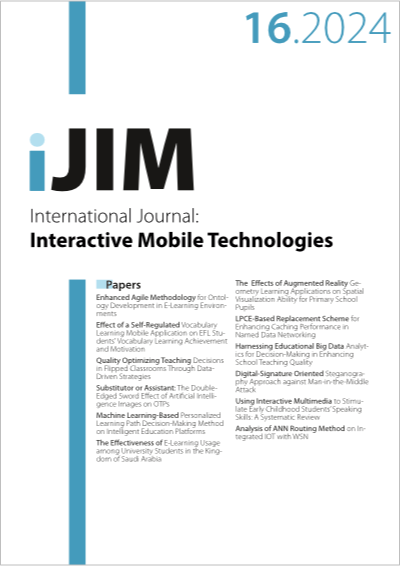Quality Optimizing Teaching Decisions in Flipped Classrooms Through Data-Driven Strategies
DOI:
https://doi.org/10.3991/ijim.v18i16.51005Keywords:
digitalized education; flipped classroom; teaching decision optimization; differential evolution; greedy backtracking; Constraint Satisfaction Problem (CSP)Abstract
In the context of digitalized educational research, the rapid advancement of internet technologies and big data has catalyzed the transformation of traditional teaching models. The flipped classroom, recognized for its flexibility and efficiency, has garnered significant attention. However, the challenge of scientifically optimizing teaching decisions in flipped classrooms to maximize educational outcomes remains critical. Previous studies have achieved some progress in optimizing teaching decisions within flipped classrooms, yet they often suffer from a lack of methodological diversity, inadequate consideration of multi-level constraints, and struggle to adapt to dynamic teaching environments. Addressing these deficiencies, this research introduces a hybrid evolutionary algorithm combining differential evolution and greedy backtracking. Defined and classified constraints within flipped classroom teaching decisions, the construction of constraint networks, and the creation of multi-level decision spaces are transformed and solved through this hybrid algorithm, offering a systematic optimization strategy. Case analysis confirms the effectiveness and practicality of the proposed method, aiming to bolster decision-making in flipped classrooms and advance the development of digitalized teaching.
Downloads
Published
How to Cite
Issue
Section
License
Copyright (c) 2024 Nan Zhang (Submitter)

This work is licensed under a Creative Commons Attribution 4.0 International License.



